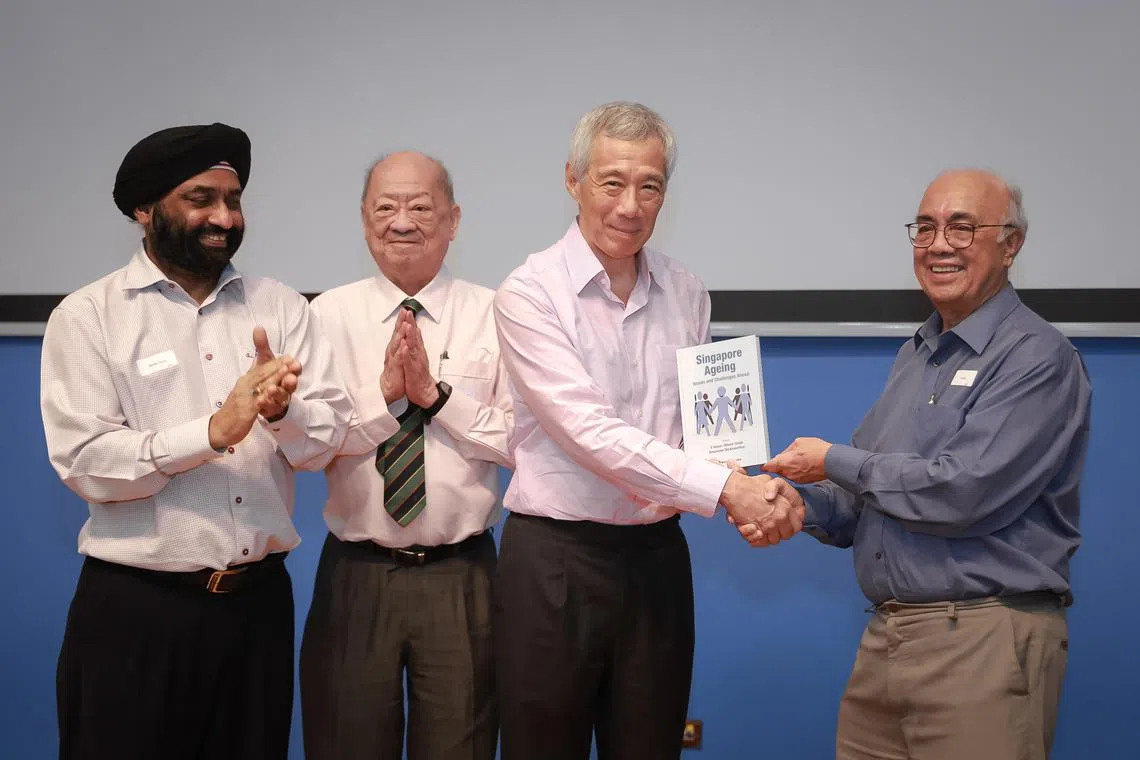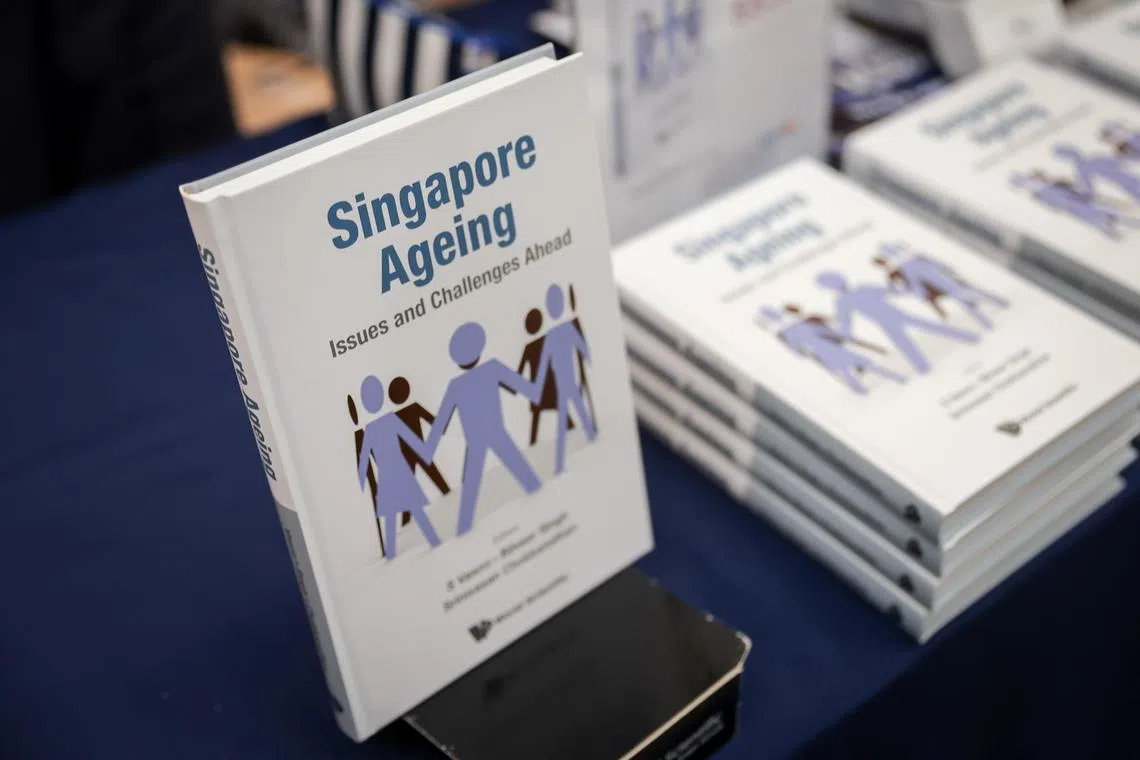Everyone must have right mindset to avoid potential grim reality of ageing population: PM Lee
Sign up now: Get ST's newsletters delivered to your inbox

PM Lee is presented the book, Singapore Ageing: Issues And Challenges Ahead by Dr S. Vasoo at the launch on April 11. With them are Associate Professor Bilveer Singh (far left) and Mr Phua Kok Khoo, chairman and editor-in-chief of publisher World Scientific.
ST PHOTO: GAVIN FOO
SINGAPORE - To avoid the grim reality of an ageing population where escalating healthcare costs burden the economy, and societal fractures arise from competing needs across age groups, everyone must have the right mindset.
Prime Minister Lee Hsien Loong said on Tuesday that individuals must embrace ageing positively, families must connect and engage with seniors at home, and employers need to support older workers and tap their experience and value.
As a society, Singapore must also strengthen the culture of respect towards seniors by understanding and valuing them, and by avoiding stereotypes that are hurtful and self-limiting, he said.
To do all this, the Government will take the lead in three key areas, said Mr Lee, who was speaking at the launch of a book titled Singapore Ageing: Issues And Challenges Ahead.
The launch was held at the Shaw Foundation Alumni House at the National University of Singapore (NUS).
The potential grim scenario was described in the book edited by Dr S. Vasoo, Associate Professor Bilveer Singh and Associate Professor Srinivasan Chokkanathan, who are from NUS’ Faculty of Arts and Social Sciences.
Mr Lee said: “In Singapore, we are determined not to go in this direction. But avoiding it will take a whole-of-society effort, and everyone having the right mindset.”
The Prime Minister said the first step to avoid such a scenario is to raise retirement and re-employment ages in step with demographic trends, as many older Singaporeans want to keep active and continue working and contributing.
In July 2022, the retirement age was raised to 63, while the re-employment age was raised to 68. raised by 2030 to 65 and 70, respectively.
The second step is to continue ensuring retirement adequacy.
“We’ve been regularly updating our Central Provident Fund (CPF) schemes so that they remain fit for purpose, in line with rising life expectancy and changing needs,” said Mr Lee.
For example, CPF Life was introduced in 2009 to provide people with the assurance of a monthly income for life, while in 2023, changes were introduced to raise the CPF monthly ceiling for all and CPF contribution rates for senior workers.
CPF is complemented by schemes such as Workfare, which supports lower-wage workers, and Silver Support, which gives cash payouts to seniors with low or no income during their working years.
The third step is to strengthen the healthcare system to meet the increasing demands of an ageing population.

The book, Singapore Ageing: Issues And Challenges Ahead, highlights challenges such as escalating healthcare costs as the population ages.
ST PHOTO: GAVIN FOO
“With Healthier SG, we are shifting decisively towards preventive care to reduce the disease burden for Singaporeans. If Singaporeans can stay healthier for longer, it will help to lighten the load on our healthcare system,” said Mr Lee.
Meanwhile, the Government continues to invest heavily in building new healthcare infrastructure and upgrading existing ones to ensure high quality and affordable care for all.
It is also expanding the range of social and long-term care services in the community to meet the desire of seniors to age in place, he noted.
“All these require significant resources, and we have taken steps, including difficult but necessary moves like raising the goods and services tax, in order to fund the increased spending to meet the needs of an ageing population,” he said.
If Singapore can do all these things right by having everyone – individuals, families, employers, society and the Government – come together with the correct mindsets and strategies to tackle ageing in the society, then it stands a good chance of realising the alternative scenario presented in the book, said Mr Lee.
This is one where seniors are “healthy, savvy, actively engaged in productive and meaningful activities, and well-respected, and society benefits from their collective wisdom and experience”.
Dr Vasoo said that Singapore society needs to be sustainable.
“Therefore, our younger Singaporean generation must think of innovative solutions for population renewal even as the future older seniors have a wealth of adaptive skills to still contribute to keep Singapore going,” he said.
PM Lee noted that countries all over the world are facing the problem of ageing populations.
Almost one in four Singaporeans is likely to be over the age of 65 by 2030, which is a massive change for society, PM Lee said.
Yet it is not so straightforward to address the challenges of an ageing population, he added, citing examples from elsewhere.
Countries in the European Union spend on average 13 per cent of their gross domestic product on old-age pensions, which will only continue to rise as the population ages, if reforms are not implemented.
For Japan, whose population is not only ageing but also shrinking, rural areas have become depopulated and villages are left empty and abandoned.
China, where more than 260 million people were over the age of 60 in 2020, is also looking very hard at this issue, as the number of seniors is expected to rise to 400 million by 2040, he said.
He added: “It is important that we continue to discuss and debate such important issues in society, to provide fresh perspectives, improve our solutions, and make a difference to hundreds of thousands of senior Singaporeans, who will one day include all of us.”
Singapore Ageing: Issues And Challenges Ahead is available at major bookstores and online at publisher World Scientific’s website



